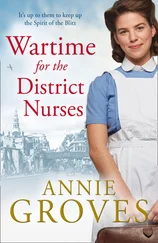‘Drew here has been sent over to London by the newspaper he works for in America to report on the war,’ Ian explained to Tilly.
Tilly nodded as she surreptitiously studied Ian’s lodger. He looked as though he was in his early twenties, his thick mid-brown hair slightly sun-bleached at the ends. He had warm brown eyes that crinkled at the corners when he smiled, his smile revealing white, even teeth. On his right hand he was wearing an impressive-looking gold ring with what looked like a crest on it. Not wanting to seem too curious, Tilly looked away politely.
Ian Simpson worked as a print setter on Fleet Street, for the Daily Express. His wife and their four young children had evacuated to Essex at the start of the war, and Tilly’s own mother had often said that it must be lonely for Ian living in the house on his own during the week.
Tilly had heard American accents before, but Drew was the first American she’d met in person. She gave him a friendly – but not too friendly – smile. At just eighteen, and with the experience of several months of war behind her, which had included her foolish crush on Dulcie’s handsome army brother, Rick, Tilly now considered herself wise enough not to pay too much attention to a good-looking young man, and Drew was good-looking, she had to admit.
Tilly glanced back in the direction from which she had come, at the pall of dust hanging on the air, the result of nightly bombing raids on London’s East End by the German Luftwaffe.
‘Well, you’ll certainly have had plenty to write about for your newspaper, with the bombings we’ve had these last few nights,’ she told the young American gravely.
‘Yes.’ Drew’s voice was equally grave. ‘I went over to Stepney in the East End this morning. I thought I had the makings of a good journalist, but finding the words to describe the devastation and horror of what’s happened there so that the folks back home will understand . . .’ He shook his head, and Tilly knew exactly what he meant. As they talked Tilly resisted the temptation to look up at the sky. These last few days of relentless air raids had left everyone’s nerves on edge, but she certainly wasn’t going to give in to her fear in front of this young American.
‘I’ve heard there were over four hundred killed on Saturday night, and three hundred and seventy on Sunday in the East End with over sixteen hundred injured,’ Ian told them. ‘And I’ve lost count of the number of air-raid alarms there’s been. Three times this afternoon we heard the air-raid warning go off, and had to leave the printing presses to get down to the shelter.’
‘It was the same with us at the hospital,’ Tilly agreed. ‘Our shelter is down in the basement of the hospital, and they’ve got the operating theatres down there as well. We can hear the bombers, even down in the shelters, though.’
‘I think you British are being magnificently brave,’ Drew told her with great sincerity.
‘It’s all very well being brave, but what I don’t understand is why we don’t hear our own anti-aircraft guns firing at the Germans,’ Tilly said with some concern.
‘Well, I might be able to answer that question for you,’ Drew told her. ‘You’ll have heard of Ed Murrow?’
Tilly nodded. Ed Murrow was a well-known American radio broadcaster.
‘Yes,’ she confirmed. ‘He does the nightly “This is London” wireless programme to America doesn’t he?’
Drew beamed her a smile of approval. ‘That’s right,’ he agreed. ‘Well, I heard him talking to some other journalists last night in the American Bar, and he was saying that the Government has left the skies open for your own fighter planes to blow the Germans out of the air.’
Tilly gave him a wan smile. She knew he had wanted to cheer her up, but as far as she could see from the terrible damage being inflicted on the city, their own fighter planes didn’t seem to be doing very much to stop London being blitzed by German bombers. Not that she was going to say so, of course. She was far too patriotic to do that.
Being patriotic, though, did not mean that there were times when she didn’t feel afraid.
All the occupants of number 13, with the exception of Sally, who was on duty, had spent the last two nights in their Anderson shelter in the garden, all of them pretending to sleep but none of them actually doing so, Tilly was sure. They had lain in their narrow bunk beds, listening to the dreadful noises of the assault on the city. The worst, in Tilly’s opinion, were those heart-stopping few minutes when all you could hear was the approaching relentless menacing purring sound made by the engines of the German bombers coming in over the city. Your stomach tensed terribly against what you knew was going to happen when the bombs started to fall. She could feel herself holding her breath now, just as she did at night when she lay there waiting for the full horror she knew was imminent: the whistle of falling bombs; the dull boom of huge explosions, which shook the ground. Somewhere in the city houses were being destroyed and people were being killed and injured. In Article Row they had been lucky – so far – but she had seen at work what was happening to those whose families and homes had been blown apart by the bombs: numbed, disbelieving white-faced people visiting their injured relatives; or even worse, those poor, poor people who came to Barts hoping against hope that the loved one who was missing might be there and alive.
Tilly, like everyone else in the department, had had to put her normal routine to one side because of the work involved in recording the details of the patients now flooding into the hospital.
You could see the tension in people’s faces. When you were out on London’s streets, crunching through the broken glass littering the pavements, you hardly dared to look at the fearful shapes of the destroyed buildings – and certainly not towards the river, where the docks had been bombed night after night and where, in the morning, some of the fires were still burning. If you heard a loud sound fear automatically gripped you, but you pushed it aside because you had to, because you didn’t want Hitler thinking he was beating down your spirit, knowing how afraid you really were.
‘Oh ho,’ Ian warned, interrupting Tilly’s thoughts, ‘here comes Nancy. Nancy likes to keep us all in order,’ he told the American. ‘She’s a bit of a stickler for making sure that none of us does anything that might lower the tone of the Row. Isn’t that right, Tilly?’
‘Yes, I’m afraid it is.’ Tilly was forced to admit ruefully. ‘Nancy likes to disapprove of things. She’s also a bit of a gossip,’ she felt obliged to warn Drew.
‘She certainly is.’ Ian pulled a face. ‘When I brought my cousin home with me the night she’d been bombed out, Nancy was on the doorstep first thing the next morning wanting to know who she was and if Barb knew she’d stayed the night. Lena soon put her right and told her what was what.’
‘I’d better go,’ Tilly told Ian. ‘Mum will be wondering where I am.’
‘It sure was nice to get to meet you,’ Drew told her with another smile.
He seemed a decent sort, Tilly acknowledged as she hurried towards number 13. Not that she was remotely interested in young men, not since Dulcie’s elder brother, Rick, had taught her the danger of giving her heart too readily. That had simply been a silly crush, but it had taught her a valuable lesson and now she intended to remain heart free.
In the kitchen of number 13, Olive, Tilly’s mother, was trying desperately not to give in to her anxiety and go to look out of the front window to check if she could see her daughter.
Although it was unlike Tilly to be late home from work, normally Olive would not have been clock-watching and worrying, but these were not normal times. When the Germans had started bombing London night and day almost a week ago, they had bombed normality out of the lives of its people, especially those poor souls who lived in the East End near the docks.
Читать дальше












